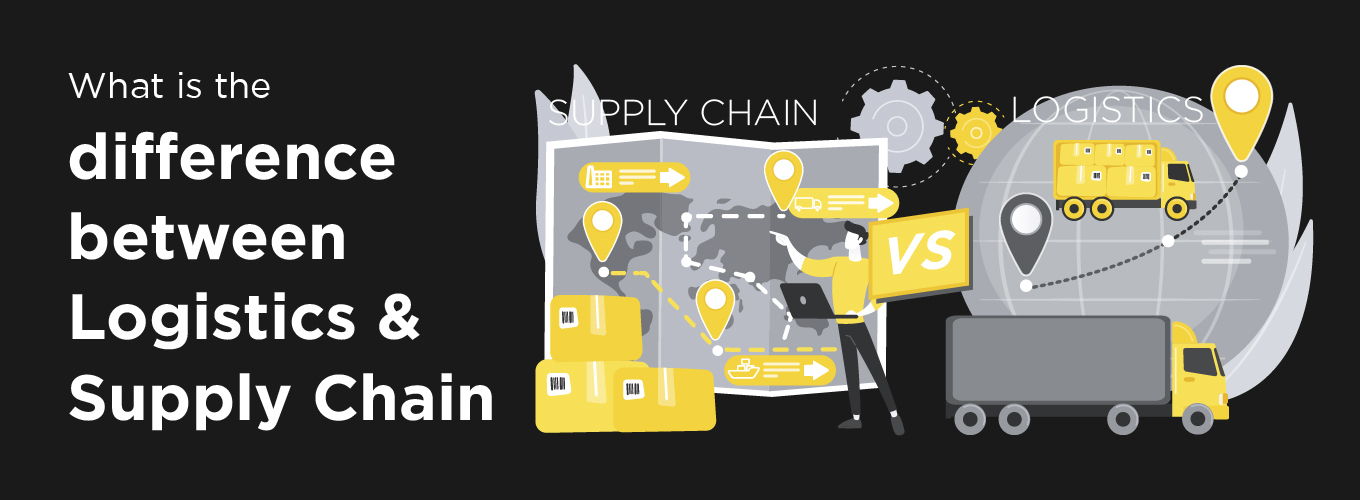What is the difference between Logistics and Supply Chain
If you have done elementary mathematics in School, you would be familiar with the terms ‘superset’ and ‘subset,’ which is how we could categorize best, supply chain management and logistics management, respectively. Supply chain management refers to a comprehensive set of functions from sourcing raw materials, procuring customer requirements, delivering goods and services on time, and order fulfillment. On the other hand, logistics management is concerned only with the final step of the process, safe and on-time delivery of finished goods/products. However, thanks to ever-evolving technology, the once-discernable functions of a product supply lifecycle are blurred, causing some to misconstrue the concepts as the same.
Clearing up definitions
Supply chain management, as explained earlier, refers to an operational framework integrating manufacturers, packaging vendors, logistics organizations, and end customers seamlessly to provide profound value to each organization that is a part of the ecosystem.
Logistics management relates to the processes and operations involved in the seamless forwarding, return, or storage of goods and services between the point of origin and the point of consumption. Logistics management is a key component of supply chain management, but it doesn’t focus on other functions such as procurement, inventory management, customer relationship management, and more.
Also Read: Top Logistics Companies In India
What are the key differences involved?
Scope of work – Supply Chain Management(SCM) focuses on managing the flow of goods – planning and sourcing materials, inventory management, labor planning and facilities management, manufacturing, and delivery of finished products while meeting customer requirements and creating competitive advantages for the organization. It involves strategizing an integrated ecosystem of multiple moving parts.
Although a key component of SCM, logistics management is largely focused on ensuring the right products reach the right stakeholders at the right time in an efficient and cost-effective manner.
Components – SCM and Logistics management are built on entirely different components. The 5 five major components of SCM are planning, sourcing, manufacturing, delivering, and returning. On the other hand, logistics management has six major components – demand planning, storage and material handling, fleet management, inventory management, and transportation management.
Technology Utilization – Considering their functions are so varied, the kinds of technology utilized by SCM and Logistics Management are also different. For instance, over the years, SCM has leveraged 3D printing technology and industrial robots for efficient production with minimal material loss. It has begun leveraging IoT and artificial intelligence for comprehensive ecosystem integration. Furthermore, blockchain’s data protection feasibility has led to SCM organizations using it for supplier data protection, loss-less data sharing, and more. Logistics management has largely focused on using automation to eliminate the human intervention required for manual tasks such as invoice reconciliation, document processing, data entry, etc. Furthermore, logistics management organizations have experimented with artificial intelligence, drone technology, and driverless autonomous transportation systems to collect real-time data and improve process and delivery efficiency.
Summarising the information mentioned above, SCM is a comprehensive set of processes and functions in which logistics management plays a crucial role.
However, given the stress on today’s supply chain ecosystem, thanks to the two-year pandemic break the world experienced, technology is seen as a silver bullet to alleviate the burden. Technology roles in logistics and supply chain domains will increase, and it is imperative to cash in on these opportunities at the earliest.
Stay tuned for updates regarding in-demand technology and engineering roles by following Xpheno on LinkedIn.









